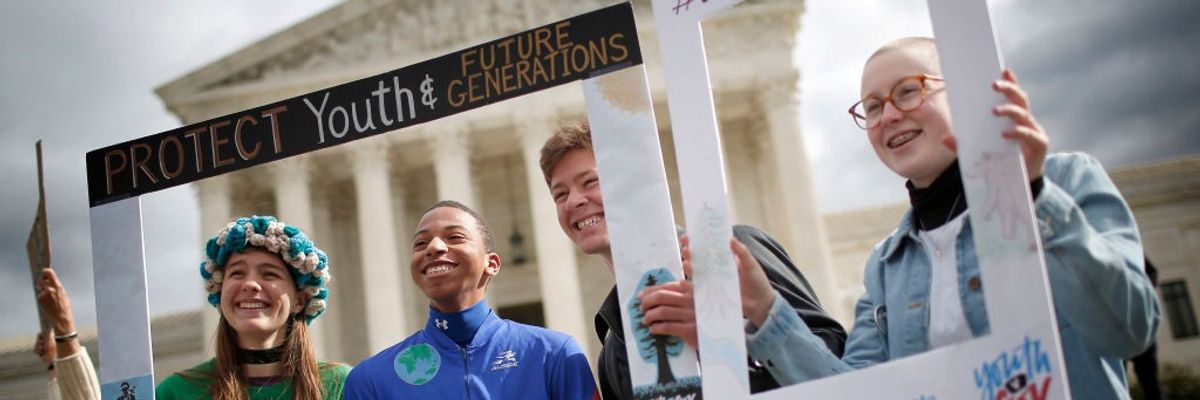
Protesters attend a rally held by Our Children’s Trust outside the U.S. Supreme Court in Washington, D.C. on October 29, 2018. (Photo: Win McNamee/Getty Images)
By Jessica Corbett
Dozens of members of Congress on Monday submitted an amicus brief to the U.S. Supreme Court supporting 21 youth plaintiffs who launched a historic constitutional climate case against the federal government nearly a decade ago.
Since Juliana v. United States was first filed in the District of Oregon in August 2015, the Obama, Trump, and Biden administrations have fought against it. Last May, a panel of three judges appointed to the 9th Circuit Court of Appeals by President-elect Donald Trump granted a request by President Joe Biden’s Department of Justice to dismiss the case.
After the U.S. Supreme Court in November denied the youth plaintiffs’ initial request for intervention regarding the panel’s decision, their attorneys filed a different type of petition last month. As Our Children’s Trust, which represents the 21 young people, explains on its website, they argued to the justices that federal courts are empowered by the U.S. Constitution and the Declaratory Judgment Act (DJA) “to resolve active disputes between citizens and their government when citizens are being personally injured by government policies, even if the relief is limited to a declaration of individual rights and government wrongs.”
The Monday filing from seven U.S. senators and 36 members of the House of Representatives argues to the nation’s top court that “the 9th Circuit’s dismissal of the petitioners’ constitutional suit for declaratory relief has no basis in law and threatens to undermine the Declaratory Judgment Act, one of the most consequential remedial statutes that Congress has ever enacted.”
The Supreme Court “should grant the petition to clarify that declaratory relief under the DJA satisfies the Article III redressability requirement,” wrote the federal lawmakers, led by Sen. Jeff Merkley (D-Ore.) and Rep. Jan Schakowsky (D-Ill.). “Doing so is necessary because Congress expressly authorized declaratory relief ‘whether or not further relief is or could be sought.'”
“The 9th Circuit’s jurisdictional holding, which prevented the district court from even reaching the question whether declaratory relief would be appropriate, conflicts with this court’s holding that the DJA is constitutional,” the lawmakers continued. “It also conflicts with this court’s holding that Article III courts may not limit DJA relief to cases where an injunction would be appropriate.”
In a Monday statement, Juliana‘s youngest plaintiff, 17-year-old Levi D., welcomed the support from the 43 members of Congress—including Sens. Ed Markey (D-Mass.) and Bernie Sanders (I-Vt.) as well as Reps. Pramila Jayapal (D-Wash.), Ro Khanna (D-Calif.), Alexandria Ocasio-Cortez (D-N.Y.), Ilhan Omar (D-Minn.), Jamie Raskin (D-Md.), and Rashida Tlaib (D-Mich.).
“After 10 years of delay, I have spent more than half of my life as a plaintiff fighting for my fundamental rights to a safe climate. Yet, the courthouse doors are still closed to us,” said Levi. “Five years ago, members of Congress stood by me and my co-plaintiffs on the steps of the Supreme Court. Today, as the climate crisis worsens and hurricanes ravage my home state of Florida, they are still with us, using their voices to weigh in on the importance of our rights to access justice and to a livable climate.”
“The recent win in Held v. State of Montana and historic settlement in Navahine v. Hawaii Department of Transportation showed the world that young people’s voices, my voice, and legal action are not just symbolic, but they hold governments accountable to protect our constitutional rights,” Levi added. “Now, it’s our turn to be heard!”
The lawmakers weren’t alone in formally supporting the young climate advocates on Monday. Public Justice and the Montana Trial Lawyers Association filed another brief that takes aim at the government’s use of mandamus—a court order directing a lower entity to perform official duties—to deny the Juliana youth a trial.
“The government’s sole argument to justify mandamus is the Department of Justice’s past and anticipated future litigation expenses associated with going to trial. That argument is firmly foreclosed by precedent,” the groups argued. “And even if it wasn’t foreclosed by precedent, the argument trivializes the extraordinary nature of mandamus and would improperly circumvent the final judgment rule.”
The organizations urged the high court to grant certiorari to uphold the mandamus standard set out in Cheney v. United States District Court for the District of Columbia in 2004. Plaintiff Miko V. said Monday that “I’m incredibly grateful to Public Justice and the Montana Trial Lawyers Association for standing with us in our fight for justice.”
“We’re not asking for special treatment; we’re demanding the right to access justice, as our constitutional democracy guarantees,” Miko stressed. “The recent victory in Held v. State of Montana demonstrates the power of youth-led legal action, and the urgent need for courts to recognize that our generation has the right to hold our government accountable. Every day that the government prevents us from presenting our case, we all lose more ground in the fight for a livable future. It’s time for the judiciary to open the courthouse doors and allow us a fair trial.”
The briefs came just a week before Big Oil-backed Trump’s second inauguration and on the same day that the U.S. Supreme Court rejected attempts by fossil fuel giants to quash a Hawaiian municipality’s lawsuit that aims to hold the climate polluters accountable, in line with justices’ previous decisions. Dozens of U.S. state and local governments have filed similar suits.
Jessica Corbett is a senior editor and staff writer for Common Dreams.
This article was published on January 13, 2025 at Common Dreams.
